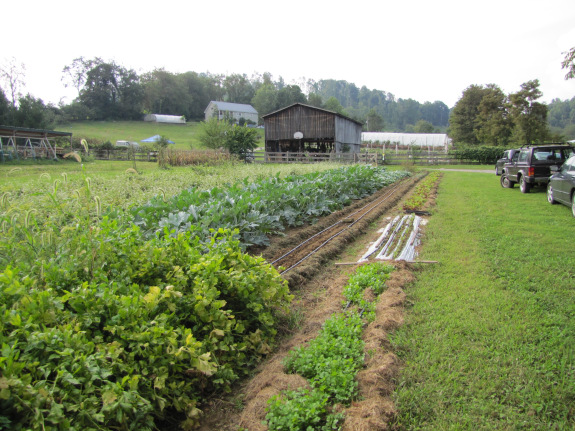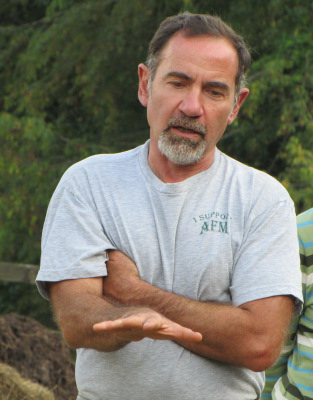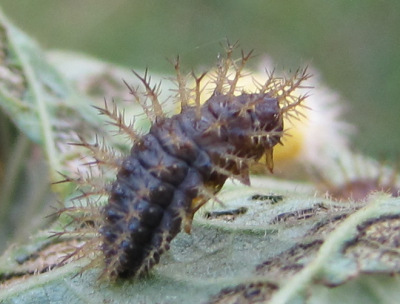
Abingdon Organics and the Pediobius wasp

 Wednesday,
Mark and I attended a riveting presentation about biochar at Abingdon
Organics, the home
and farm of Anthony and Laurel Flaccavento. The first time I
toured Anthony's farm, I was blown away by his experiments, and by the
colors and sheer beauty of his crops. I figured there was no way
I could ever achieve such perfection.
Wednesday,
Mark and I attended a riveting presentation about biochar at Abingdon
Organics, the home
and farm of Anthony and Laurel Flaccavento. The first time I
toured Anthony's farm, I was blown away by his experiments, and by the
colors and sheer beauty of his crops. I figured there was no way
I could ever achieve such perfection.
Even though he's still
head and shoulders above us, I actually felt a little better about my
own garden after this visit. Anthony's tomatoes were keeling over
even faster than ours (although he had been eating them since May) and he told us that this
was the worst year he'd ever seen for Mexican bean beetles. I
guess misery loves company....
On
the other hand, Anthony never throws in the towel, even when faced with
total bean defoliation. He discovered that you can buy a
 parasitic wasp (Pediobius
foveolatus) that
will lay its eggs inside the bean beetle larvae and wipe out your
infestation...at least for a season. The brown larva shown here
is a parasitized bean beetle that won't do any more eating on Anthony's
beans. (In the background, you can see a yellowish, unparasitized
larva of the same age.)
parasitic wasp (Pediobius
foveolatus) that
will lay its eggs inside the bean beetle larvae and wipe out your
infestation...at least for a season. The brown larva shown here
is a parasitized bean beetle that won't do any more eating on Anthony's
beans. (In the background, you can see a yellowish, unparasitized
larva of the same age.)
Unfortunately, Pediobius wasps are tropical imports
and won't overwinter in our climate, so you have to keep buying them
each year, making the proposition less sustainable than I  would
like. Still, if you're dying to grow beans and the Mexican bean
beetle is your archnemesis, you should give Tom Dorsey a call at
609-530-4192. He doesn't appear to have a website, but is
Anthony's wasp source.
would
like. Still, if you're dying to grow beans and the Mexican bean
beetle is your archnemesis, you should give Tom Dorsey a call at
609-530-4192. He doesn't appear to have a website, but is
Anthony's wasp source.
Stay tuned for more
tidbits from our exciting day in the big city (and, hopefully, a
lunchtime series on biochar!) Meanwhile, I have to end with
another highlight of our trip --- meeting two loyal blog readers who
came over to compliment us on the Walden Effect. Thanks for your kind
words, Rocky (and sister, whose name I didn't quite catch.)
Want more in-depth information? Browse through our books.
Or explore more posts by date or by subject.
About us: Anna Hess and Mark Hamilton spent over a decade living self-sufficiently in the mountains of Virginia before moving north to start over from scratch in the foothills of Ohio. They've experimented with permaculture, no-till gardening, trailersteading, home-based microbusinesses and much more, writing about their adventures in both blogs and books.
Want to be notified when new comments are posted on this page? Click on the RSS button after you add a comment to subscribe to the comment feed, or simply check the box beside "email replies to me" while writing your comment.

If anyone if having trouble finding Tom Dorsey, he works for the New Jersey Department of Agriculture, they rear Pediobius: http://www.nj.gov/agriculture/divisions/pi/prog/biological.html. There are also a number of other insectaries that rear these wasps. Here is an excellent article that describes how the wasp can me best used: http://www.ct.gov/caes/cwp/view.asp?a=2815&q=376726.
Also, I am a PhD student at Virginia Tech working on Mexican bean beetle; please contact me or my lab with any questions about this pest. And we always appreciate the opportunity to come visit your farm/garden and learn from you! LouisN@vt.edu or https://www.facebook.com/pages/Virginia-Tech-Vegetable-Entomology/195639230587492. Happy farming!